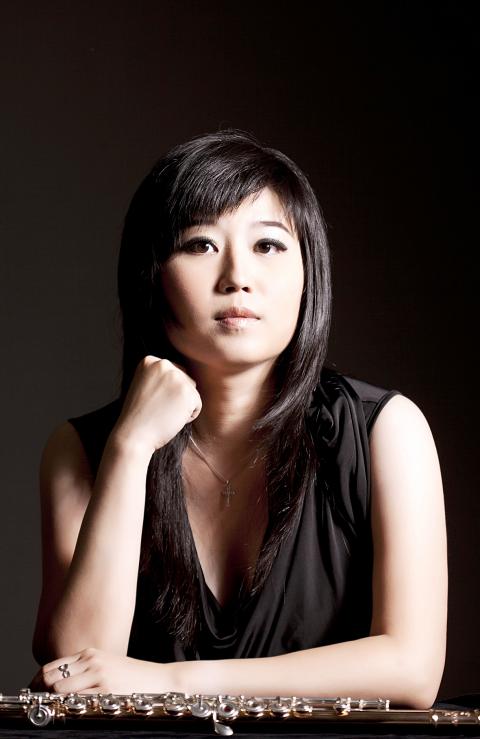Tseng Han-jung (曾涵榕) considers the flute the problem child of Taiwan’s classical music scene. This instrument is always hanging around, is both seen and heard, but rarely ever reaches its full potential.
“Sometimes you hear the flute in wind ensembles, where it goes bong-qia-bong-qia, a bit like circus music,” said Tseng, a teacher and performance flautist who studied under Andrea Wild and Claus-Christian Schuster at the City of Vienna University.
“Or you hear the flute in unaccompanied pieces, which usually focus on displaying technique and go hua-la-la-la-la, up and down and up and down.”

Photo courtesy of Tseng Han-jung
For Tseng, classical flute performances are trending toward these selections in part because musicians have relatively few Baroque, Classical or Romantic flute pieces to choose from.
Beethoven wrote countless sonatas for piano, cello and violin, but none for the flute. And though Mozart’s best-known opera is The Magic Flute, the composer himself did not favor the flute, which up until the 1850s was an intractable recorder-like instrument.
“He received requests for flute concertos, but he didn’t want to write them. Once he just rearranged his oboe concerto, from C major to D major, and said, ‘Here you go,” she said.
Shortlist
At an upcoming recital, Tseng will play a program of just four pieces, but she hopes they present traits of the flute that are rarely seen.
She opens with Johann Nepomuk Hummel’s flute and piano sonata in D major, a repartee between her and pianist Liu Hui-ping (劉慧平): The piano asks questions, and the flute has a bright simple voice that sings back flirtatiously.
From the Romantic repertoire, she has chosen Franz Schubert’s Introduction and Variations on Trockne Blumen, a 25-minute showcase of sadness. Each of the seven variations is slightly and differently mournful — even the last one, when the flute shifts to a joyous E major.
Tseng will also play two 20th century pieces, Jindrich Feld’s Flute Sonata and Nino Rota’s Trio. Rota, composer for the first two Godfather films, features the flute as the most nimble character in a tense standoff against piano and violin.
Feld’s sonata sounds like “a hamster running a wheel,” said Tseng. The flute moves awkwardly and sometimes humorously along a percussive piano score. Along the way, the duo produces a pileup of pretty but mostly dissonant notes.
“It will sound like the performers are doing something wrong,” Tseng said.
Tseng is a proponent of Feld and other contemporary classical composers of ear-bending music: pieces that do not trade on pleasing melody or dazzling speed. She tries consciously to perform their works. “Musicality isn’t just about beautiful and driving melodies — music can be like drawing, telling a story. Sometimes there are no melodic lines, just a series of effects.”
“I don’t think it’s that people cannot accept it, it’s that they don’t have much exposure or knowledge of how to receive it,” she said.

June 9 to June 15 A photo of two men riding trendy high-wheel Penny-Farthing bicycles past a Qing Dynasty gate aptly captures the essence of Taipei in 1897 — a newly colonized city on the cusp of great change. The Japanese began making significant modifications to the cityscape in 1899, tearing down Qing-era structures, widening boulevards and installing Western-style infrastructure and buildings. The photographer, Minosuke Imamura, only spent a year in Taiwan as a cartographer for the governor-general’s office, but he left behind a treasure trove of 130 images showing life at the onset of Japanese rule, spanning July 1897 to

The Taiwan People’s Party (TPP) on May 18 held a rally in Taichung to mark the anniversary of President William Lai’s (賴清德) inauguration on May 20. The title of the rally could be loosely translated to “May 18 recall fraudulent goods” (518退貨ㄌㄨㄚˋ!). Unlike in English, where the terms are the same, “recall” (退貨) in this context refers to product recalls due to damaged, defective or fraudulent merchandise, not the political recalls (罷免) currently dominating the headlines. I attended the rally to determine if the impression was correct that the TPP under party Chairman Huang Kuo-Chang (黃國昌) had little of a

At Computex 2025, Nvidia CEO Jensen Huang (黃仁勳) urged the government to subsidize AI. “All schools in Taiwan must integrate AI into their curricula,” he declared. A few months earlier, he said, “If I were a student today, I’d immediately start using tools like ChatGPT, Gemini Pro and Grok to learn, write and accelerate my thinking.” Huang sees the AI-bullet train leaving the station. And as one of its drivers, he’s worried about youth not getting on board — bad for their careers, and bad for his workforce. As a semiconductor supply-chain powerhouse and AI hub wannabe, Taiwan is seeing

In an interview posted online by United Daily News (UDN) on May 26, current Chinese Nationalist Party (KMT) Chairman Eric Chu (朱立倫) was asked about Taichung Mayor Lu Shiow-yen (盧秀燕) replacing him as party chair. Though not yet officially running, by the customs of Taiwan politics, Lu has been signalling she is both running for party chair and to be the party’s 2028 presidential candidate. She told an international media outlet that she was considering a run. She also gave a speech in Keelung on national priorities and foreign affairs. For details, see the May 23 edition of this column,